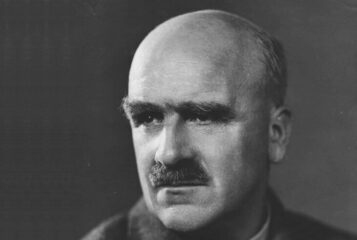First of Millions is the title of episode one of the BBC 4 radio drama Turning Point, a series of audio dramas, highlighting critical events in recent history within social and scientific fields; ones that have had a permanent impact on life in the UK and beyond. Each episode is just under an hour long, with First of Millions dramatising the story of the development of IVF. It focuses on the scientific, medical, and human journey that led to the birth of Louise Brown, the world's first IVF baby.
I first heard this audio drama on my car radio a few weeks ago and was intrigued to know how it would present itself. I was mindful that this was created for a general audience and that radio is the most 'turned off' of all the media platforms; it takes very little for a radio audience to disengage. As a scientist, I hoped that this would not happen, as opportunities to engage with the public are rare and precious.
I am pleased to say I found the audio drama absorbing and it felt like stepping into a time machine and being transported back to a very different era. Here, I found it best to observe, rather than judge the story by present-day standards. This acted as a reminder of how much has changed, not just scientifically but also socially; medicine and science were generally male spaces, with the female characters having supporting roles.
The newness of the technology was well-captured and gave a realistic impression of how close to science fiction it must have felt at that time. It skims the surface of the obstacles and opposition faced by Dr Robert Edwards, a research scientist at the University of Cambridge, and Patrick Steptoe, a consultant obstetrician working in Oldham, whose culmination of a decade of collaborative work resulted in the demonstration that it was possible to create healthy, living children through IVF.
Dr Edwards and Steptoe had to face technical difficulties such as timing, and social and political forces that bore down on them. There was a prevailing fear in society that children born by IVF would be disabled, as the world was still in the shadow of the thalidomide scandal. Hitler's eugenics programmes created a fear on the other side of this spectrum, that IVF would lead to scientists 'playing God'. There was also a lesser-voiced fear of changing the structure of 'normal' families and shame and secrecy surrounding infertility. While these forces are listed in the audio drama, we get an impression of Steptoe and Dr Edwards' fears rather than a well-defined picture, like dark shape-shifting forces looming over the science.
The structure of the storyline works in a satisfying and logical way – the opening and closing minutes are occupied by the Nobel Prize award – providing an overarching framework and creating a cyclical timeline. The linear stories of the Browns' personal relationship and the ground-breaking science stories run within this, making the narrative easy to follow.
In adapting a long and complex scientific odyssey for one hour of audio drama, timelines must be compressed, characters simplified, and everything made lean. To keep audiences engaged, dramatisation and exaggeration are needed too, as are artificial deadlines and conversations under pressure. This somewhat manufactured sense of urgency and excitement are vital ingredients to keep the drama engaging.
Some scientists listening to the dramatic and exaggerated parts may feel irritated, at odds with their intuitive accuracy and not perfectly aligned with how they themselves would convey it. But out beyond this point of view lies another perspective: this audio drama is zooming out beyond the walls of the laboratories and clinics and repositioning itself in society. It is about seeing the big picture as opposed to seeing the full picture. It delivers a complex and emotive concept to a diverse lay audience in a way that is real and relatable and does this in a concise way. It is significant that this is portrayed through radio – arguably the most accessible of all media.
The struggles faced by the Brown family, Dr Edward's great personal sacrifices and the opposition he faced, as well as Steptoe's failing health, make for a compelling story, beyond all the science. While this is certainly a simplified version of real-life events, simplicity can be potent. It is the simplicity and the humanity of this remarkable story of science creating humans, that serves to make the science itself more human too.






Leave a Reply
You must be logged in to post a comment.